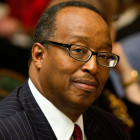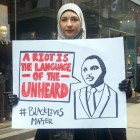
OP-ED: Inaction and Unbudging Tally Keeps Our Juvenile Courts the Same
|
I try to remain conscious of my own role in perpetuating a system of racial and socioeconomic inequality. Have I failed to speak? Have I failed to act?
Juvenile Justice Information Exchange (https://jjie.org/page/234/)

In late September, Torri was driving down the highway with her 11-year-old son Junior in the back seat when her phone started ringing.
It was the Hamilton County Sheriff’s deputy who worked at Junior’s middle school in Chattanooga, Tennessee. Deputy Arthur Richardson asked Torri where she was. She told him she was on the way to a family birthday dinner at LongHorn Steakhouse.
“He said, ‘Is Junior with you?’” Torri recalled.
Earlier that day, Junior had been accused by other students of making a threat against the school. When Torri had come to pick him up, she’d spoken with Richardson and with administrators, who’d told her he was allowed to return to class the next day. The principal had said she would carry out an investigation then. ProPublica and WPLN are using a nickname for Junior and not including Torri’s last name at the family’s request, to prevent him from being identifiable.
When Richardson called her in the car, Torri immediately felt uneasy. He didn’t say much before hanging up, and she thought about turning around to go home. But she kept driving. When they walked into the restaurant, Torri watched as Junior happily greeted his family.
Soon her phone rang again. It was the deputy. He said he was outside in the strip mall’s parking lot and needed to talk to Junior. Torri called Junior’s stepdad, Kevin Boyer, for extra support, putting him on speaker as she went outside to talk to Richardson. She left Junior with the family, wanting to protect her son for as long as she could ...

I try to remain conscious of my own role in perpetuating a system of racial and socioeconomic inequality. Have I failed to speak? Have I failed to act?

WASHINGTON — The head of the union representing employees at the federal Office of Juvenile Justice and Delinquency Prevention has called for the resignation of OJJDP Administrator Robert L. Listenbee Jr., saying the agency has “spiraled out of control” and morale has plummeted under his leadership.

In Georgia, armed robbery with a firearm goes straight to adult court. It also means a mandatory minimum sentence of 20 years in prison unless transferred by the prosecutor to juvenile court.

Attending the parade on Martin Luther King Jr. Day in Atlanta this year was the first time I have ever positively engaged in the holiday.

WASHINGTON — A national juvenile justice campaign launched today with the ambitious goals of halving youth incarceration in 15 states over the next five years while expanding community-based alternatives for offenders.

Many of the kids in juvenile detention with substance abuse disorders get poor or no treatment, according to Reclaiming Futures, a nonprofit that helps young people in trouble with drugs, alcohol and crime.

With youth crime rates and numbers of incarcerated youths declining, now is the ideal time to review how juvenile incarceration meets the needs of youths, their families and society. California is in the process of allocating $80 million in funding for counties to build juvenile facilities. To ensure these facilities are rehabilitative, they need to originate from a belief in the capacity for people to change. Psychologists refer to this belief as mindset; it is a well-established phenomenon in education, and is equally applicable to our juvenile justice system. Mindset applies to everyone.

NEW YORK — The image and words of Dr. Martin Luther King Jr. could be seen and heard everywhere the Dream4Justice march went, from Harlem to Midtown, Monday afternoon. But as the marchers walked a slow and peaceful four miles over as many hours, King’s voice mixed with the protesters’ now familiar chants: “I have a dream” alongside “I can’t breathe” and “No justice, no peace.”
King’s memory brought organizers and protesters together but the marchers’ demands came from more recent deaths. In memory of Michael Brown, Eric Garner and others who had been killed by police, the march ended near the United Nations to bring attention to police brutality as a human rights issue. Marchers called for immediate policy change at the city and state levels in keeping with King’s philosophy. “We are non-violent but we are not peaceful,” said Tamika Mallory, an organizer and board member of The Gathering for Justice.